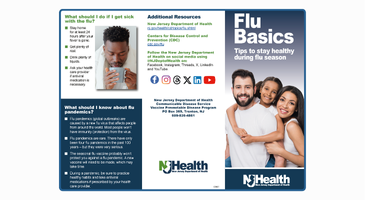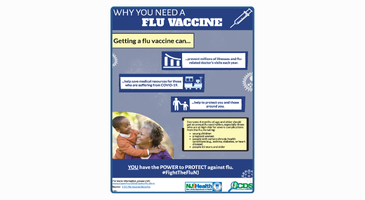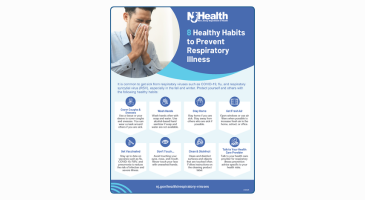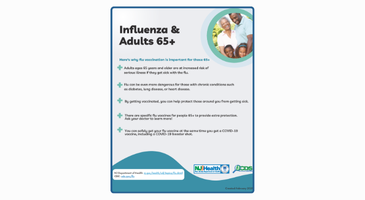Healthy New Jersey
Influenza (Flu)
Influenza (Flu)
Influenza (flu) is a contagious respiratory illness caused by influenza. It can cause mild to severe illness. Serious outcomes of flu infection can result in hospitalization or death. Some people, such as older people, young children, and people with certain health conditions are at high risk for serious flu complications.
NJDOH works closely with the health care and public health community to conduct surveillance for seasonal and novel influenza, respond to seasonal influenza outbreaks, and prepare for the occurrence of novel influenza.
Data and Reports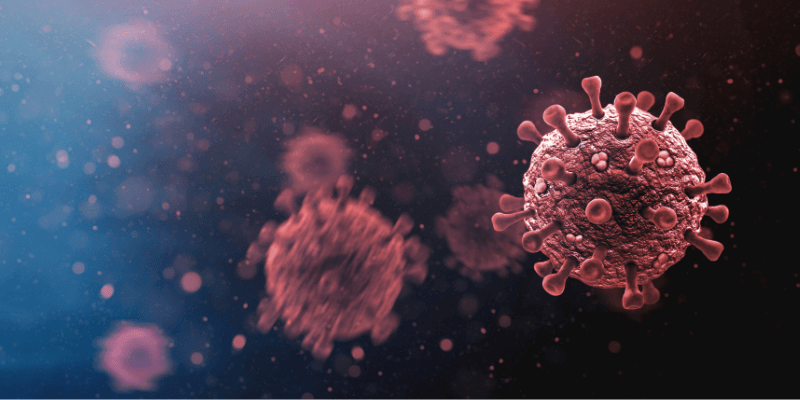
On this page
Flu Information
Symptoms
Common symptoms of the flu include:
- Fever or feeling feverish/chills
- Cough
- Sore throat
- Runny or stuffy nose
- Muscle or body aches
- Fatigue (tiredness)
- Some people may have vomiting and diarrhea, though this is more common in children than adults.
Transmission
The flu spreads when people who are infected spread droplets by coughing, sneezing, or talking closely to others. Less commonly, a person might get flu by touching a surface or object that has flu virus on it and then touching their own mouth, nose, or eyes.
Flu season typically begins in late fall and can last through the winter into early spring. While flu activity usually peaks between December and February, cases can occur as late as May. You can monitor current flu activity throughout New Jersey by visiting our respiratory illness dashboard.
Prevention Tips
- Get a yearly flu vaccine.
- Wash your hands regularly with soap and water.
- Cover coughs and sneezes
- Avoid close contact with sick people.
- Stay home when you are sick to prevent spreading the flu to others.
- Wearing a mask is an additional prevention strategy that you can choose to further protect yourself and others.
The best way to protect yourself and your loved ones from the flu is by getting a yearly flu vaccine.
Everyone aged 6 months and older is eligible to receive the flu vaccine. In addition to vaccination, other preventive measures, such as washing your hands regularly, avoiding contact with sick people, and covering your nose and mouth when sneezing or coughing, can help slow the spread of the flu.
Why should I get the flu vaccine?
The flu vaccine helps your immune system fight off the influenza virus. Flu vaccines are updated every year to protect against the most common strains expected to circulate during flu season. Even if you typically don't get sick, getting vaccinated reduces your chances of spreading the virus to others—especially those at higher risk of severe illness, hospitalization, or death from the flu.
Where can I get the flu vaccine?
- Local pharmacies
- Your health care provider's office
- Local health department (contact them in advance to check availability)
When should I get the vaccine?
The CDC recommends getting the flu vaccine in the fall or early winter before flu season peaks. You can get the flu vaccine at the same time as other vaccines, including the COVID-19 vaccine.
Common Side Effects
- Soreness, redness, or swelling at the injection site
- Low-grade fever
- Muscle aches
- Headache
For Professionals
Surveillance
- New Jersey Respiratory Illness Reports
- Influenza Surveillance Overview
- Influenza Surveillance Memo
- Flu Activity Level Definitions
- Pediatric Influenza Surveillance Memo
- Pediatric Influenza CDRSS Quick Entry Guide
- Pediatric Influenza Reporting and Investigation
- Surveillance Frequently Asked Questions
- Weekly Influenza Surveillance Reports
Laboratory
- Seasonal Influenza Technical Guidance
- Request for Immunological/Isolation Services-Viral Testing Unit
Outbreak Information
- Guidelines for the Control of Respiratory Virus Outbreaks in Long-Term Care and Other Institutional Settings
- Prevention and Control Measures for Outbreaks in School Settings
Flu Vaccination for Health Care Personnel
- Register for the Flu Vaccination for Health Care Personnel Education Module
- Health Care Workers Flu Vaccine Poster (8.5 x 14)
- Health Care Workers Flu Vaccine FAQs
- Health Care Workers Need a Yearly Flu Vaccine Flyer
- New Jersey Hospital Association: NJ Fights Flu Toolkit
- Immunization Action Coalition Influenza Honor Roll and Resources
 Official Site of The State of New Jersey
Official Site of The State of New Jersey
